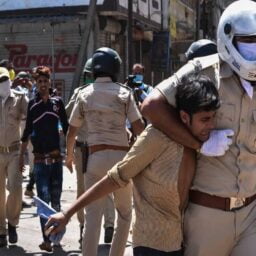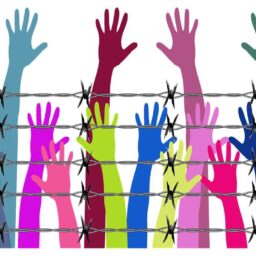“If you violate Nature’s laws you are your own prosecuting attorney, judge, jury, and hangman.”
– Luther Burbank
On June 29th, 2021, Canada recorded an all-time high temperature of 49.5 degrees Celsius, the Environment and Climate Change Canada conveyed this shocking news through their Twitter handle, and the World Meteorological Organization said it was a “pressure-cooker” heatwave and warned that such extreme temperatures pose a major threat to people’s health, agriculture, and the environment. In May 2021 NASA shared a recent image of the melting glacier and also said that the glaciers are melting rapidly and becoming smaller day by day. We are witnessing these types of news frequently in the last half a decade, although climate change is not a new phenomenon, the rapidly cumulative change is a serious concern for the whole world.
Climate change is bringing rising sea levels and increased flooding to some cities around the world and drought and water shortages to others, and the poor people of these places have to suffer the most, whether it is the situation of drought or flood. Climate change will play havoc on India’s water supply. Heavy rainfall events might increase, while the number of wet days might decrease in the future. It means there will be severe changes in rainfall patterns, which might create an even worse situation than now.
There are many debates about the direct relationship between Climate Change and Human Rights; but in India and many other developing countries, we are seeing that people of the poor class have to suffer the most from the effects of climate change, and here the question arises that how can we protect the human rights if we cannot avail necessities of life i.e., water? Climate change is not only increasing temperature, it particularly affects people in the global South, who are already struggling to access their rights to water, food, shelter, livelihood, and culture. The right to life is a universally recognized Fundamental Right, still, every year over 150000 premature deaths are occurring due to climate change.
There is no doubt that this is anthropogenic climate change, and over-exploitation of nature and natural resources leads to this severity. The major cause of global warming is the rising emission of greenhouse gases, and they are rising due to burning coal and oil, deforestation, increasing livestock farming (Cows and sheep produce large amounts of methane when they digest their food), and the use of Fertilisers containing nitrogen produce nitrous oxide emissions.
Society at large suffers the most in this regard and the sad part is that we are not doing anything to prevent it that too when we know that climate change is not a long-term effect, rather it is happening now. The change we see only at the politics over Environment, and it has not given any concrete result till now. Environmental concerns have been part of the U.S. political agenda for about 150 years.
From the 1970s, scientists are started to warn us about the changing pattern of climate through satellite images, that’s why, at the G7’s request, the United Nations set up the Intergovernmental Panel on Climate Change (IPCC) and its role was to publish the report and provide images of the current state of the climate. In 1992 Rio Summit acknowledged the role of humans in global warming. And in 1997 Kyoto Protocol taken place, its goal is to reduce greenhouses gases by 5.2% between 2008 and 2012. Thus, till now there is a plurality of approaches and no single pattern has been accepted by all the countries, which makes it difficult to achieve.
Industrialization and modernization have undoubtedly improved the condition of the poor class by providing them employment, and it has a great significance in the economy also. If we start to stop running industries then it will still impact the lives and human rights of the people. So, we have to find a way for sustainable development for both environment and industries.
India has taken many steps in the ways of solution and participated in the international events, but it consistently accusing the west of spreading global warming. Indian Constitution has provided right to health under the right life, Article 48-A deals with the Protection and Improvement of Environment and Safeguarding of Forests and Wildlife, and based on these provisions we have the Environment (Protection) Act, 1986 and the Wild Life (Protection) Act, 1972 (as amended in 1986). Under Part IV-A of the Directive Principles of State Policy, Fundamental Duties are added under Article 51-A by the 42nd Amendment of the Constitution in 1976. Article 51-A(g) provides the fundamental Duties about the environment which incorporates – to guard and improve the natural environment including forests, lakes, rivers, and wildlife and have compassion for living creatures.
Our Judiciary has always been most active for the betterment of our environment and delivered several judgments and guidelines, which saved many forests, rivers, and places from pollution; i.e., in Shreeram Food and Fertilizer case[i] the Apex Court directed that companies manufacturing hazardous chemical substance to take all necessary safety measures before reopening of the plant. In M.C. Mehta v. Union of India (1987)[ii], Supreme Court ordered the closure of tanneries at Jajmau, Kanpur for polluting Ganga. In Intellectual Forum Tirupati v. the State of A.P.[iii], the Supreme Court held that the environment must not be destroyed for urban development. And there are many more cases where the Apex Court strictly directed not to exploit nature and saved basic Human Rights of people.
By the power of Judicial Review, the judiciary formulated certain principles to develop a better regime for protecting the environment;
- The Polluter Pays Principle
- Precautionary Principle
- Public Trust Doctrine
- Sustainable Development
By the above discussion, we can understand how directly climate change is impacting Human Rights. Nature always fulfilled our needs and but we exploited nature and tries to extract as much as we can from her, and as we all know everything comes with a price, if we continue to do the same things as before then we will surely lead to the destruction of humankind. People need to keep their greed aside, and use nature according to their necessity and not according to their greed. Many organizations, institutions including international courts, government of countries, judicial authority of countries, United Nation Human Rights Commission have been explored the relationship between Human Rights and Climate Change and found out that it is impacting Human Rights. So, this is the need of an hour that not only on the individual level but the National and International level steps are important to be taken, which shows the real improvement.
The ongoing Coronavirus pandemic affected many lives, but for the betterment of Climate it was a great opportunity, it was a chance to move our planet towards a greener future, but we seem to lost it too. Still, some things can be done at the Government’s level, such as;
- Promoting the use of Electric vehicles. A study suggested that light-duty vehicle electrification can provide additional societal benefits, including significant reductions in gasoline fuel use, and significant reductions in GHG emissions, and along with that there are financial benefits to electric utility customers.
- Imposing carbon tax, so that companies and industries reduce the use of fossil fuels. Pricing the carbon content of domestic production and imports will help cut effluents.
- Raising awareness about climate change and how we can help to reduce it.
There is En-ROADS named policy simulation model that gives everyone the chance to design their scenarios to limit future global warming. The simulation, developed by Climate Interactive, Ventana Systems, and MIT Sloan, and suggests that what steps will improve how many situations in climate. We should learn from these studies and take steps accordingly.
Author(s) Name: Chittrupa (Student, Faculty of Law, University of Allahabad)
Referenes:
[i] M.C. Mehta v. Union of India (1986) 2 SCC 176
[ii] 1987 4 SCC 463
[iii] AIR 2006 SC 1350






